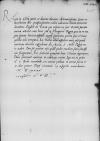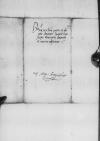Letter #2307
Samuel MACIEJOWSKI to Ioannes DANTISCUSCracow, 1540-04-19
| received Braunsberg (Braniewo), 1540-05-06 Manuscript sources:
| ||||
Text & apparatus & commentaryPlain textText & commentaryText & apparatus
Reverendissimo in Christo Patri et Domino, domino
Reverendissime in Christo Pater et Domine, domine observatissime.
Cum cubicularius hic proficisceretur, nolui vacuum litteris meis eum dimittere. Rediit ex
Ego me in gratiam Dominationis or Dominationi⌈DominationisDominationis or Dominationi⌉ Vestrae Reverendissimae commendo, cui omnia prolixa ex animo faveo et a Deo precor.
Dat(ae) or Dat(um)⌈Dat(ae)Dat(ae) or Dat(um)⌉
Eiusdem Dominationis Vestrae Reverendissimae se superinscribed in place of crossed-out a⌈aee superinscribed in place of crossed-out a⌉rvitor


 BCz, 1597, p. 1028
BCz, 1597, p. 1028